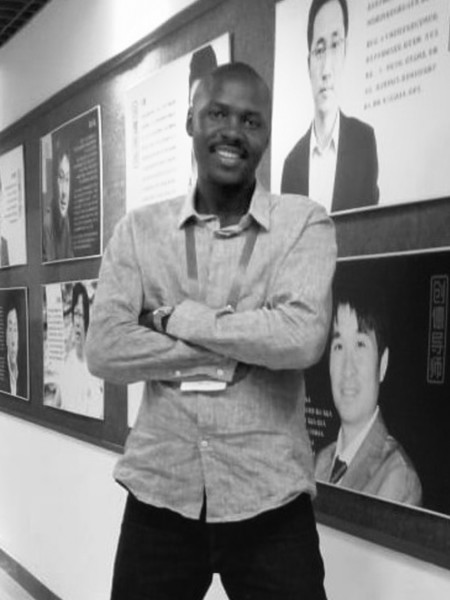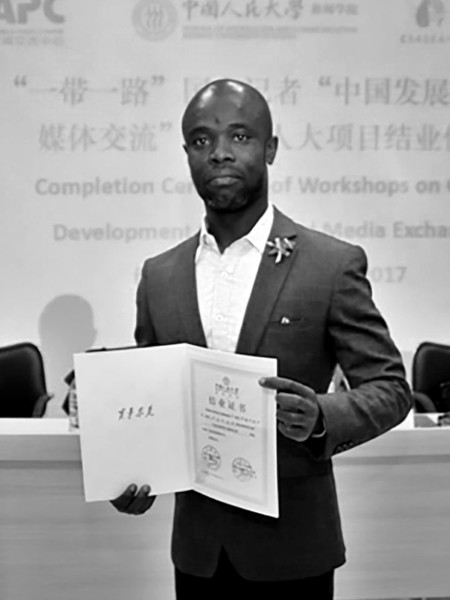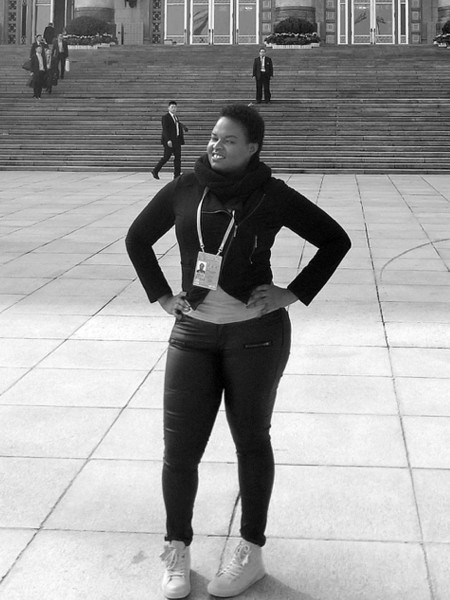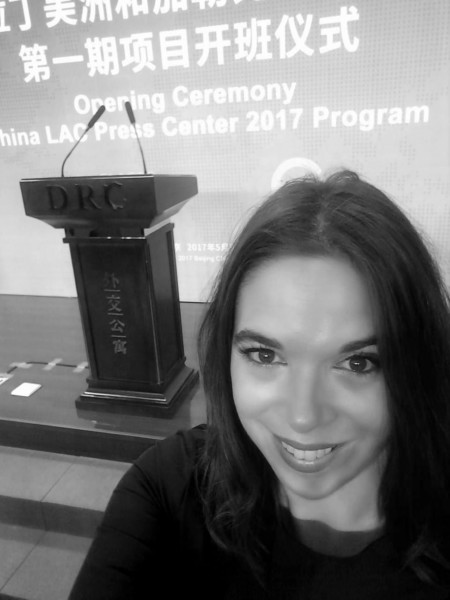This February, in an auditorium in Beijing, 50 journalists representing 49 African and Asian countries gathered for a ceremony to mark the opening of the 2019 China-Africa and China-Asia Pacific press centers. Over the coming 10 months, the journalists would take an array of classes, in Chinese language, politics, economics, and other topics. They would conduct interviews with government and company executives, cover high-profile events, and participate in internships at select Chinese news outlets. The programs are fully funded, and few expenses are spared: the journalists would be housed in apartments in central Beijing, receive a monthly stipend for food and fun, and go on trips to popular cities and attractions across China. Speaking from a podium, Hu Zhengyue, the vice president of the China Public Diplomacy Association, a non-profit under the Chinese Ministry of Foreign Affairs, encouraged the journalists to tell stories that would foster goodwill between his country and theirs. “Our long-standing histories, splendid civilizations, and traditional friendship knit us tightly together,” Hu said. “Our hearts are connected.”
China has spent billions in recent years to bolster its soft power abroad, and the news media often takes center stage in its efforts. Xinhua, China’s newswire service, aims to build 200 bureaus by 2020 (the Associated Press operates 254), and state-run CGTN, a rebranding of CCTV for international audiences, is hiring around the world. Chinese interests have acquired shares in a slew of foreign media companies, in some cases purchasing them outright. Chinese diplomats are writing op-eds in foreign papers. And paid inserts from China Daily, a top English-language outlet, can be found in newspapers from The Statesman, in India, to The Des Moines Register, in Iowa. In China’s bilateral agreements with other countries, media is routinely identified as a key area for cooperation and exchange.
The China-Africa Press Center and China-Asia Pacific Press Center—annual programs that launched in 2014 and 2016, respectively—are just two of many expense-paid initiatives welcoming foreign journalists to China. Similar programs exist for Latin America, the Caribbean, Eurasia, South Asia, and the Middle East, and still others offer a multitude of shorter-term junkets. In sum, according to Reporters Without Borders, more than 3,400 media workers from at least 146 countries have received some form of professional training courtesy of the Chinese government.
The goal, experts say, is not just to improve China’s image abroad. “This is about control of the narrative and legitimization of the [Communist] Party’s power and governance,” says David Bandurski, co-director of the Hong Kong-based China Media Project. In the long term, Bandurski adds, as China looms ever-larger on the world stage, its pursuit of a sanitized image of itself might also threaten a shift in journalistic norms.
Indeed, China appears to get what it pays for. “It was a fruitful and enriching ten-month journey,” one 2017 program participant wrote for the Philippine News Agency. “Journalists commended China for giving them the opportunity to explore different beautiful places,” the report continued, using language straight from Communist Party propaganda. “Others praised China for lifting over 700 million of its people out of poverty and its miraculous rise as the world’s second largest economy in a span of only three decades.”
In other cases the reaction was more nuanced. I spoke with four journalists who have participated in China’s press outreach programs about the good and bad of their experiences, their observations about Chinese media, and the role journalism can play in helping countries navigate a future with China. Their accounts have been edited and condensed for clarity.
Bonface Otieno
Nairobi, Kenya
Otieno, 32, is a reporter at the Business Daily newspaper, a publication of East Africa’s largest independent news company, the Nation Media Group. He traveled to China in September 2017.

Otieno in Beijing.
The Chinese want to be viewed as this big brother out there who is doing good things and who means well for your country. They paint relations as win-win, when in fact it is mostly win-lose. Every Friday in my newsroom, they put a copy of China Daily on the journalists’ desks. I don’t think I’ve ever seen a single negative story in that crazy paper. I would bring it home for my friends to wrap meat with. Then I told the guy who brings it, “Man, never bring me this thing again.”
Before the trip, I thought China was one of the most horrible places in the world. I heard that it was polluted, that the internet was censored. I thought that these are people who want to look down on others. If the Chinese brought me to Beijing to influence my journalism, they failed. But in a way the trip did change my perception. I got to know some Chinese people and understand things about them that I had not. In fact, Beijing was very polluted, but on the trip we also got to travel to Northern parts of the country, where the air was quite fresh.
We were about 200 journalists in total, from all over Africa. The facilitators for our program were from the Ministry of Foreign Affairs, and they were quite nice. They took us to museums, markets, social joints, all kinds of places, to show us how they do their stuff. The problem with these guys, though, was that the moment you ask them hard questions they feel offended. We wanted to understand why the media in China does not ever criticize the government. We said, “What kind of journalism is this?” But I felt their answers were not here and not there, they were not satisfactory. Another Kenyan journalist, from a sister newspaper of Business Daily, persisted in asking critical questions, and they began giving him less time to speak during discussions. We knew they were trying to change our perceptions, of course, but they should not have been so obvious.
When I came back from China, my editor said to me, “Bonface, I hope you have not been bribed in China so that you will come home and sugarcoat your stories.” I told him, “Of course not, I am not like that.” I have written quite a lot about transportation, for example, including Kenya’s Standard Gauge Railway, which China financed, and I would say my stories have been a bit critical. The Kenyan public wants to see hard, investigative stuff, you know? If I do not write serious stories, the business guys who see me on the streets or at social gatherings, they will say, “What is this crap you are giving us to read, Bonface?” But as a journalist you cannot write well about something you do not understand. And today I do feel I am in a better position to write about China.
Alpha Daffae Senkpeni
Monrovia, Liberia
Senkpeni, 34, is a reporter and editor at Liberia’s FrontPage Africa, a daily newspaper. He is also the director of a program that places work by rural journalists in major Liberian outlets. He traveled to China through the China-Africa Press Center, from February to December 2017.

Senkpeni at Beijing’s Renmin University.
The stereotypical view of China in my country is that it is very poor. We see Chinese people in Liberia taking odd jobs in factories and selling poor quality things in shops downtown. I read a lot about China and I write about China, so I knew this was not true, but still I was shocked when I saw it for myself. Even in the airport, seeing the infrastructure, I thought, “Yeah, this is a serious country on the verge of doing things for itself and ready to go to the next level.”
It was challenging, though, being in a country where there are not many black people. You have this feeling that something is strange here. People are looking at you on the subway like, “Who is this guy?” But I think this is a normal phenomenon in a country that has not had much opportunity to know and interact with Africans. I tended to brush it off and keep myself among people who are knowledgeable and tolerant of foreigners.
It was interesting seeing how their media works, but it was also difficult, because in Liberia democracy is real and journalists do what we like to do. In China, the state controls what the media say, and there is not a space to express grievance with policies. I worked for six weeks on the national desk at China Daily, which gave me a view of how messages are processed for public consumption. The newsroom was very impressive, and the salary was good, better than what I make in Liberia, but I appreciate what I have here.
I became a journalist because I stand for democracy. I don’t call myself a big fanatic of the West, but I believe in freedom, and I believe today that what we do in Liberia as a media house—checking on the government, holding its feet to the fire—is the reason we have been able to solve some of our problems. It is the reason we are who we are. This trip was designed to sell China’s image, yes, but I am not going to trade my principles for some Chinese belief about journalism. If China wants to strike a good deal with Liberia I will support it, but if it is not in our interest I won’t. I’ve recently written some articles that were very critical of China. They wanted to mortgage our natural resources, and I said, “No, this is not a good deal.” In the end the deal did not go through.
Yvonnie Akonda Sundu
Lilongwe, Malawi
Sundu, 33, is an editor for Malawi’s Nation Publications Limited, which issues numerous private newspapers and magazines. From 2014 to 2017, she served as a vice-chairperson of MISA Malawi, a nonprofit that promotes press freedom. She traveled to China through the China-Africa Press Center, from February to December 2017.

Sundu outside of the Great Hall of the People in Tiananmen Square.
I say that I am lucky, because I have been to China three times. The first two times were for journalism workshops. The third time, I got to know the country even better, because though we were based in Beijing we were traveling to different provinces and cities. We went to Shanghai, Shenzhen, Guangzhou, Xiamen—where we covered the BRICS [Brazil, Russia, India, China, and South Africa] summit—and many other places. I found that there were different cultural aspects that gave me a better understanding of the country.
In Malawi, we often tell negative, critical stories, so that we might bring change. In China, they tell positive stories, which they say will bring positive feelings and lead to more positive outcomes. Yes, the government might be doing something wrong, but they focus always on what the government is doing right. In March, for example, China’s government held the “two sessions” [the country’s largest and most important political meetings, held annually], and every media house in China was running stories for weeks, putting a lot of positive energy into them. This created real excitement, and everybody in the country was paying attention. I do not believe that what we do in Malawi is wrong, but I think that, at times, we should borrow from this aspect of what the Chinese media is doing, so that we might be even more impactful than we are today.
In my country, there are some who don’t want to hear anything about China, because of the mindset that has been propagated in Western media. But the Chinese are here to stay for good, as far as I’m concerned. As such, I believe it is important for journalists to have an open mind and understand what China stands for that is good, and also where China gets it wrong. Otherwise, it is a disservice to the Malawian people. Whatever I write in my job is based on the facts, whether it will reflect badly on China or not. Maybe stories that are deemed negative will not be published in state media, because China is seen as a dear friend of Malawi. But our private media is powerful and vibrant, and I do not believe the government or Chinese embassy will influence our coverage.
I should say that China is doing a lot to take journalists from Africa to China, but not enough in my view to also make Chinese journalists understand Africa. This should be two-way traffic. I met a man who believed Malawi was a city in South Africa. If the Chinese government would send them here, they would know really what we mean when we say, “Africa is poor,” and what we mean when we say, “Africa is beautiful.” Unfortunately, the emphasis seems to be only on Africa knowing more about China and not the other way around.
Leticia Pogoriles
Buenos Aires, Argentina
Pogoriles, 38, worked as a culture and international affairs reporter and editor for Argentina’s national news agency, Télam. She recently co-founded a publishing company that translates literature, poetry, and nonfiction between Spanish and Chinese. She traveled to China through the China-Latin America & Caribbean Press Center, from May to November 2017.

Pogoriles at the opening ceremony of the China-Latin America & Caribbean Press Center.
We were eleven people, from nine countries in Latin America. On just the tenth day of our trip we saw Xi Jinping. I was like, “Wow!” In Argentina, there is not a good understanding of China, and there’s also this huge culture gap. But even if you don’t think you have a relationship with China, China has a big relationship with you. If we’re smart, we should look into this country. (“It’s the economy, stupid.”) So, I wanted to write for my readers about who these leaders are. Who is Xi Jinping, and what does he mean for the future of China and the world?
I always wrote what I wanted to write, and I never felt they were meddling with my perception of the facts. Our coordinator was a lovely woman from the foreign affairs ministry, who was very smart and spoke very good Spanish. I am a free thinker, and if I have a problem I talk about it. With her we could always speak openly. It was not always the same when we interviewed authorities. They accepted critical questions, but often they had the same answer and the same words, no matter what we asked. If they were offended I didn’t care. I’m a journalist. I’ll ask whatever I want.
Our coordinator was also very flexible. You could say, “I want to write about women in China,” and she would think and then, later, she’d bring in the head of a women’s university to speak with us. When I wanted to write about bike sharing, she took us to Ofo [a bike-share startup]. Where we were in Beijing, it was a very upscale area, we were living like wealthy people. One day I said, “Okay, where are the poor people?” And they arranged a trip for us to a very rural part of Sichuan. There, I spoke with this old lady who was asthmatic. She told me that if the government had not helped her receive medicine, she might be dead. Maybe she had lessons about what to say, of course. But I live in a country where that just doesn’t happen, so for me it was very impactful.
Of course, there are things about China and China’s media that I do not like. They put a girl in jail for writing about homosexuality. For me, that’s like, “What the fuck?” But I talked to many young people and academics in China. They know where they live. They know how the world works. And many of them also feel very happy and proud. I don’t know. It’s not my system, but I try to understand. I am a people person and an internationalist. I want to build bridges. In China, I just had this feeling that something is happening here.
ICYMI: Rethinking foreign reporting at the AP
Andrew McCormick is an independent journalist and former CJR Delacorte Fellow. His work has appeared in the New York Times, The Atlantic, the South China Morning Post, and more. Follow him on Twitter @AndrewMcCormck.


